Search Results for: girl on the train
This genre, once a secret handshake between in-the-know writers and audiences, has been all but forgotten. Is a sleeper screenwriter ready to revive it?
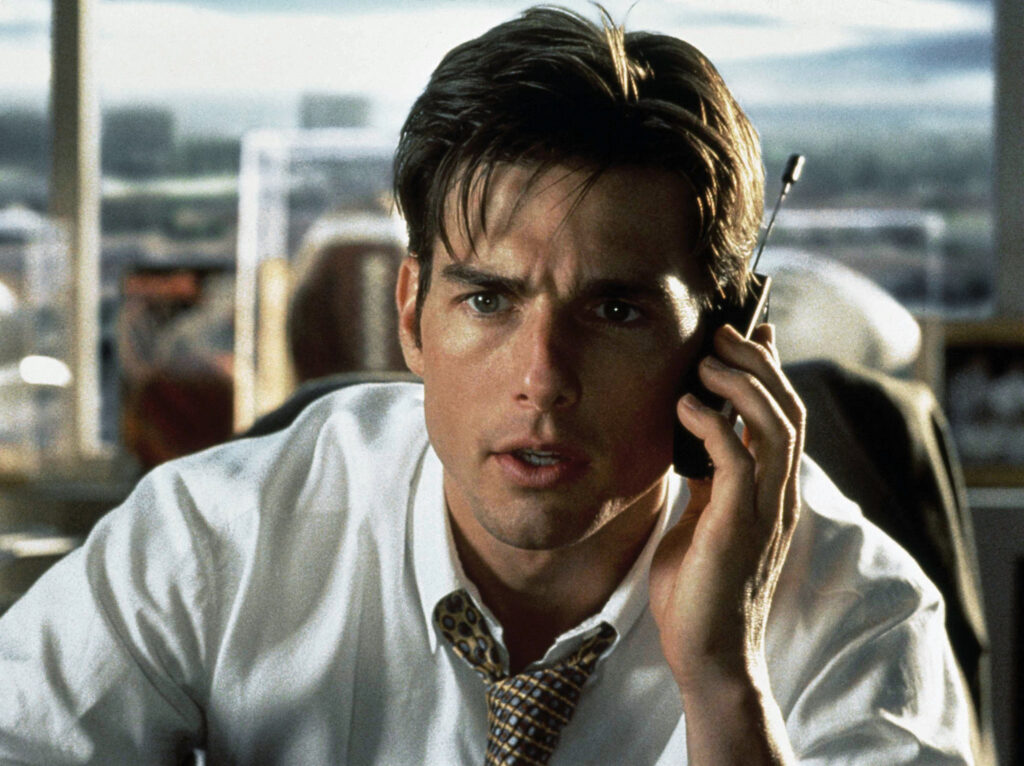
One of the movies I watched recently for my dialogue book was the romantic comedy, Jerry Maguire. That movie has some of the most iconic lines ever written in it. SHOW ME THE MONNNEYYYYYY! Cameron Crowe had been steadily working up to that moment in time and captured the American zeitgeist with that movie. You think Stranger Things has a cultural impact? Imagine that times 20 with Jerry Maguire.
Romantic comedies have been on my mind lately after reading all these articles about “Bros” tanking at the box office. One of the arguments for why the film failed was that women are the key demo for romantic comedies. So if you give them a romantic comedy without a woman in it, they have no one to relate to. Now you’re dependent on men for your box office. But, oh yeah, men don’t show up for romantic comedies.
Which brings me back to Crowe. Crowe was the guy who figured out the formula for getting men to show up to romantic comedies. He centered his movies around a male main character. He made that character slightly alpha, so as to create an, almost, wish-fulfillment version of a hero for men to root for. And then he didn’t shy away from the love story, which ensured that women got everything they wanted out of the movie as well.
Crowe first birthed this formula in Say Anything. That’s the movie where John Cusack plays Lloyd Dobler, a fast-talking kickboxing instructor who falls in love with a girl who’s way too close to her father. To this day, that film has one of the 25 most iconic images in all of film in it, which is Lloyd holding up the boombox outside Diane’s window playing Peter Gabriel’s, “In Your Eyes.”
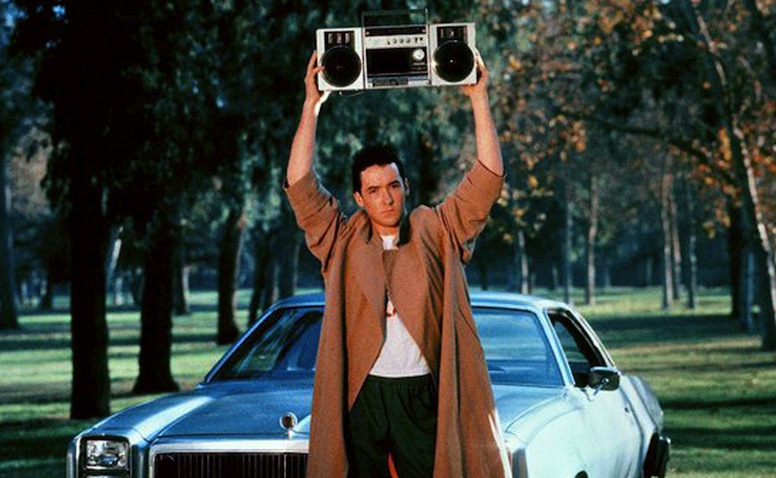
But he really turned the formula loose in Jerry Maguire, where we had the overtly alpha sports agent, Jerry Maguire, played by Tom Cruise, try to start his own agency. The movie was the pinnacle of romantic comedies made for men. It had one of the most powerful bromances ever in a movie (with wide receiver and client, Rod Tidwell). It had this wish-fulfillment scenario that all guys love of starting your own business and putting everything on the line to make it work. And, just like Say Anything, it didn’t shy away from the romance.
This was the secret ingredient that no other writer in town seemed to recognize. Some Hollywood writers knew how to write a guy’s movie. Others knew how how to write a girl’s movie. But nobody knew how to mix the two. The key was giving us that “Male” centric storyline but treating the romance with respect, as opposed to making it an afterthought.
There’s one other writer-director who understood the power of this. He just did it in a different genre. That was James Cameron. James Cameron brought the boys on board with his alpha male main characters, some rad special effects and/or cool sci-fi elements, and then he wholly embraced the romance, which ensured that women showed up too. He rode that formula to, at one point, the two most successful movies in history, in Titanic and Avatar.
Getting back to Crowe again, something happened after Jerry Maguire. Elizabethtown had the exact same formula as his previous films. The main character had the cool alpha male job of being a sneaker CEO. Crowe committed to the romance. But something didn’t work. And he tried to do it again with Aloha. Giving us that “cool” military satellite storyline for men, along with the key romance between Bradley Cooper and Emma Stone. But the movie didn’t connect with anybody, men or women. I could write a book about all the mistakes that probably contributed to its failure but the point was, Crowe was now out of the picture with this genre and, except for a couple of exceptions (“Hitch” comes to mind), Hollywood forgot about it.
Until…..…
A young comic/director named Judd Apatow realized that he could tweak the formula. His main change would be to use beta male main characters as opposed to alpha ones. These characters would be dorks, nerds, with not much going on in their life. This would bring in a different kind of male viewer – guys who identified with those groups. But the part of the formula he kept in tact was embracing the romantic components of the story, which was essential to bringing in the female audience.
He also made one other adjustment. He called his movies comedies instead of romantic comedies. It was a branding choice that made men feel more comfortable going to see these films.
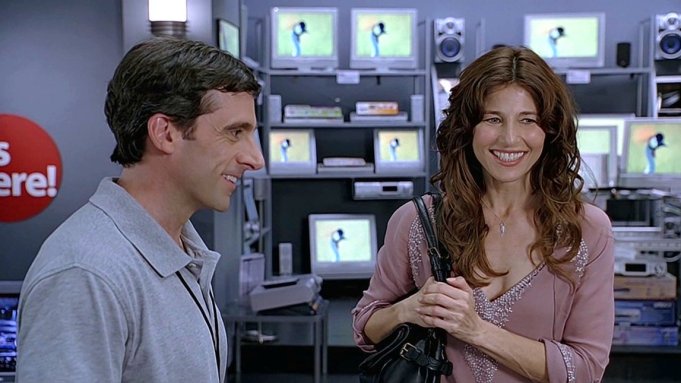
Whether by design or not, Apatow had stumbled into the same equation that had made Cameron Crowe a household name. His new tweaking of the formula gave us two instant classics: The 40 Year Old Virgin and Knocked Up. So it was more than a little bizarre when Apatow abandoned the formula after Knocked Up. Not surprisingly, his movies stopped doing as well. I guess, creatively, he was more interested in drama at the time, which is all well and good. But it left Hollywood’s best kept genre secret without a champion. And that leads us all the way to today. Nobody’s used this formula since.
How could that be?
Hollywood doesn’t just leave money on the table.
There has to be a reason.
Actually, several things happened that contributed to Hollywood forgetting all about this money-printing genre.
First, since 2000, traditional romantic comedies started to do less than stellar numbers at the box office. She’s Out of My League, Friends with Benefits, Leap Year, Just Friends. It was one miss after another. This created the pervasive thought that romantic comedies just didn’t work in the market anymore. A misnomer because it wasn’t that they didn’t work. It was that the movies weren’t as good.
Then Bridesmaids came along and everything changed. It created a movement in Hollywood where leading women were the new leading men. And what better genre to have a leading lady in than the genre that did so well with women in the first place, romantic comedies. It didn’t help that the actress leading all of the big romantic comedies as this time was the devil herself in Katherine Heigel.
Combined with the rise of the Bechedel Test, any remaining male writers who were interested in writing romantic comedies, realized that they weren’t needed here anymore, and moved on to other genres. Throw the birth of streaming into the mix, which seemed to better fit the comedy and romance genres, and this all but pulled romantic comedies off the big screen, which killed the perception of the genre. Now they were seen as “lower tier” movies.
Meanwhile, female writers were mostly writing wish-fulfillment rom-coms that didn’t even attempt to cater to men. This made it so a genre that was already struggling to bring in men had closed the door on them completely.
Another factor is that this industry continues to tell writers, subconsciously or otherwise, don’t write these movies. If you pitched a male-leaning rom-com to the average studio exec right now, they’d look at you cross-eyed. “You want to put a male lead in a romantic comedy?” “You want the female character to be in a supportive role?” “You want her to fall for the man? As opposed to live her best life and not be dependent on a man?” “Are you crazy?”
This is where Hollywood gets it wrong. When it comes down to it, people are going to see what they want to see. Not what Hollywood wants them to want to see. There’s no better example of this than Bros. Hollywood so wanted people to want to see that movie. But there’s the disconnect. You can’t make people want to see something, no matter how good your intentions are. The real world is not a Benchedel Test.

I’m telling you, the male-centric romantic comedy is a goldmine. It’s been proven repeatedly. And it’s there for the taking because very few people know how to write them. Why can’t you be that person? Now, I’m not saying to write one of these movies if you’re not a comedy or romance guy. I’m a big believer that you have to love the genre you’re writing in to write something great. But if this is your genre, don’t be scared off from writing it. Your script is going to feel like a breath of fresh air when people read it since everyone’s been trained to only write these female-led rom-coms right now. It is the perfect time to stand out.
I’m sharing this with you because Hollywood can be really dumb these days and it’s made them forget about what movies people actually want to see. Top Gun proved that in spades. I think the person who writes the next Jerry Maguire is going to prove it as well.
$$$ – SUPER DEAL ON SCRIPT NOTES! – $$$ – I’m letting TWO MORE people in on that newsletter deal. 4 pages of notes on your script for just $299. That’s 200 dollars off my regular rate. E-mail me at carsonreeves1@gmail.com with the subject line, “DEAL,” and you’ll be first in line to reserve a slot. If you’ve got a TV pilot, I can take another 50 bucks off the price. Take advantage of this! You never how long it will be before the next deal!
 Emma Radacanu (last year’s winner)
Emma Radacanu (last year’s winner)
The next two weeks are two of my favorite weeks of the year.
That’s because the U.S. Open is on!!!
I fire up my wide-screen TV, turn on ESPN, and have luscious sweaty 4K bodies banging groundstrokes at each other in the background while I work.
Since I know you’re all dying to get my U.S. Open picks, here’s a quick preview of the tournament. This is Serena Williams’ last major tournament and, I’m afraid, she’s going to lose early. She’s just not in shape. So she can’t move to the ball fast enough to take on the top players. She might win a round. But she’ll be out by the second round for sure. With that said, her and her sister are playing doubles together. Since you don’t need to move as much in doubles, they might make a deep little run. I’d love to see that.
What’s so exciting about this U.S. Open is that there are no favorites on either side. If I had to bet, I would say that the Polish Punisher and number 1 seed, Iga Swiatek, will win the women’s tournament. But she’s far from a sure thing. Emma Raducanu, who won the tournament last year, has been disappointing since then and the whispers around the tour are that she’s a bigger one-hit-wonder than Devo.
On the men’s side, who the heck knows what’s going on. Djokovic is out because he’s not vaxxed. Medvedev has been playing stinky. Nadal is beat up and probably won’t make it to the second week. Wonder Boy, Alcaraz, who many are predicting will win double-digit grand slams, seems to have hit a plateau this season. The guy has the biggest forehand I’ve ever seen in my life but for whatever reason, he’s not unleashing it.
 Escape from Alcaraz
Escape from Alcaraz
I would love to see Kyrgios do well but he’s such a wild card. My pick for winning the tournament is either the Greek Freak, Stefano Tsisipas, or the Italian Non-Stallion, Jannik Sinner. Both have beautiful backhands, Sinner’s two-handed, and Tsisipas one-handed. I could watch these two crank backhands all day.
Speaking of spirited competitions, did anyone go to the movies this weekend? After looking at the box office numbers, it sure doesn’t seem like it. The top film, The Invitation, made just 7 million bucks. I’m not going to call it the death of cinema yet because they didn’t even release a big film. But 7 million!? Come on!
The studios and theaters seem to know your interest is waning so next Saturday, they’re offering movie tickets FOR JUST 3 BUCKS! It’s National Cinema Day, baby! I was definitely excited to take advantage of this but then I wondered, wait a minute, is there a movie out right now that I actually want to see?
 Daisy Edgar-Jones
Daisy Edgar-Jones
I noticed this “little movie that could,” Where the Crawdads Sing, just cross 80 million bucks. That 80 million, by the way, is just as much as Bullet Train. A movie about a girl living in a swamp is making just as much money as a Brad Pitt actioneer. Welcome to the bizarre world of Hollywood box office post-pandemic. I might go see the film for that alone. Also, I’ve made no secrets how much I love Crawdad star, Daisy Edgar-Jones, who came out of Normal People. This movie over-performing means she’s on the cusp of becoming the next big “it” girl.
One of the sadder results form this weekend is George Miller’s, “Three Thousand Years of Longing.” The film opened in 2500 theaters and took in just 2.8 million bucks. Why is this a big deal? Cause this is the guy who created one of the coolest movies ever in Mad Max: Fury Road! And his follow-up is this?
I think what George did was leverage his success with Fury Road to make this long-time passion project. And the thing with passion projects is that there tends to be a reason they’re hard to make. Namely, they’re not appealing enough to a big audience. So no one wants to finance them. But hey, I appreciate Miller for trying. He wanted to do something different. He did it. It didn’t work out. But that’s art. If we always knew what would hit, it wouldn’t be any fun.
One thing I’m noticing is that we are definitely knee-deep in a new era where mega-TV shows are now competing with theatrical movies. It used to be there was no competition cause you could only do so much with a TV budget. But when you get to see the real theatrical Hulk on TV now? When you get to see a 30 million dollar pilot with dragons? Or a billion dollar Lord of the Rings adaptation? Those are legitimate alternatives for going to the movies.
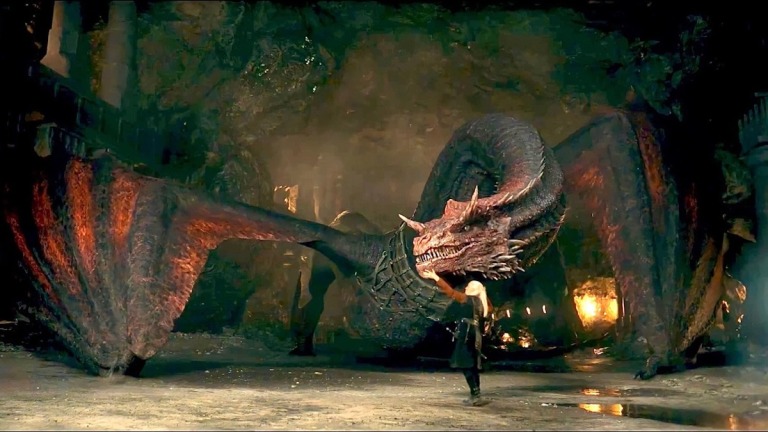
That’s not to say this is always going to be the case. I’m one of these people who isn’t convinced the streamers will be able to keep these budgets up. The reason they’re doing it now is because they’re trying to establish dominance in the fast-growing industry of streaming. But once the music stops and we know where everyone’s sitting, I think they’re going to start pulling back. They have to. There’s no way they can keep this insane spending up.
In the meantime, what are you going to watch? A movie (The Invitation) that stars the 11th most important character in the Fast and Furious franchise? Or a Star Wars show? I think the answer is obvious.
It’s yet another reminder that CONCEPT IS KING – something I was just talking about Thursday. When you’re coming up with movie ideas, you have to think like that guy who’s sitting there on a Thursday night, who may or may not want to go to the movies this weekend. He’s leaning towards not going cause there isn’t a new Marvel movie out. What are you giving that person that will make him want to go? It’s got to be a big juicy idea. Which reminds me, High Concept Showdown is coming people! So get those scripts ready.
What: AMATEUR SHOWDOWN – HIGH CONCEPT EDITION
When: Entries due December 1 by 8pm Pacific Time
How: E-mail me your title, genre, logline, any extra pitch you want to make about why your script deserves a shot, and, of course, a PDF of the screenplay.
Where: carsonreeves3@gmail.com
Anything else?: You can start sending in your scripts right now!
One minor story I caught from this weekend was the showings of two former, “WHAT THE HELL DID I JUST READ” script reviews. Bodies Bodies Bodies and Vengeance. I was shocked to find that both movies received relatively strong critical scores (Vengeance at 79% and Bodies Bodies Bodies at 86%). Cause I thought these scripts were beyond awful. Bodies Bodies bodies was a glorified game of drunken hide and seek. And Vengeance had one of the most despicable unlikable protagonists I’ve come across in a long time.
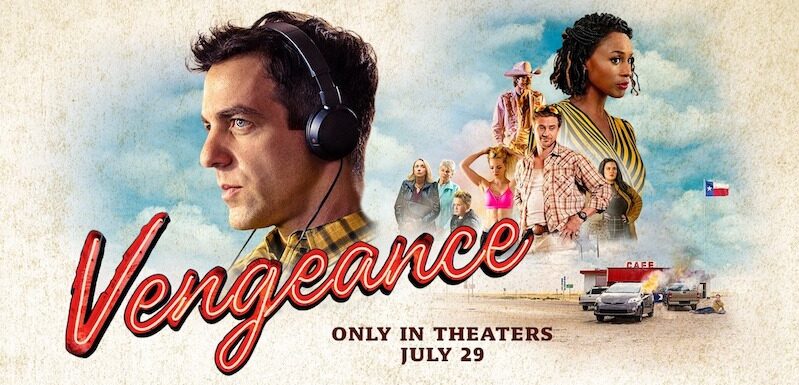
Why are these movies working for people? I don’t know for sure because I haven’t seen them yet, lol. But I do know that when the writer is also the director, there are two things you can drastically change about a script. The first is the stylistic look of your movie. Bodies Bodies Bodies looks a lot more stylistic than I imagined it would be. Which definitely helps give it its own identity.
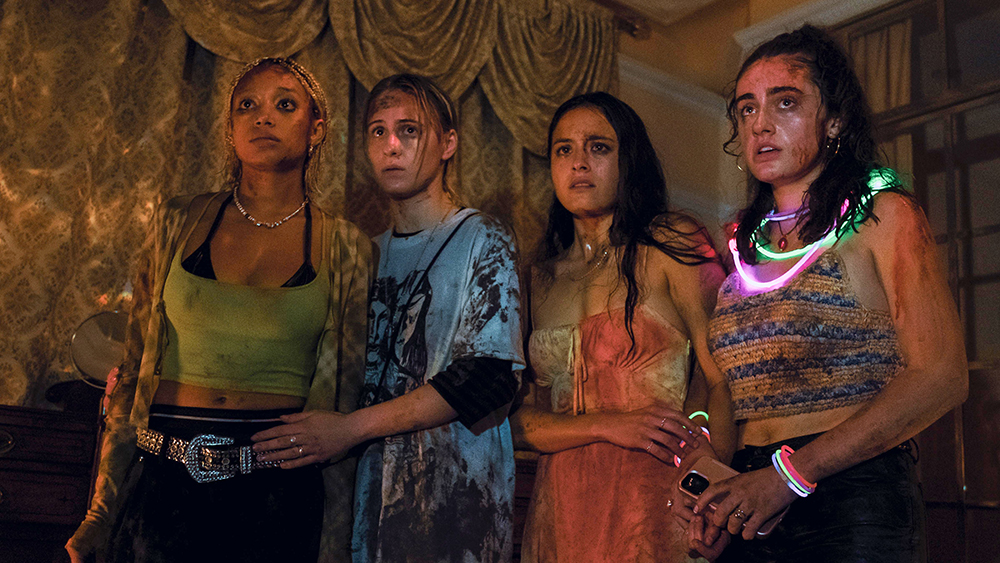
The other big thing you can do is soften the look and feel of a character onscreen who, on paper, was a big fat jerk. You can do this through casting. Or, in B.J. Novak’s case (who was the writer, director, and star), you simply play the character a lot nicer. And it looks like that’s what he did to offset how unlikable that character was on the page.
I’m all about admitting when I’m wrong about a script. I think it’s important for all screenwriters to understand why something works even if they, themselves, hate it. And I believe that’s what happened here. Although I’m curious, for those of you who saw the films, what did you think of them? Should I give them a shot? Or was my original analysis correct and they’re both benefactors of the current critical trend of propping movies up more for what they and the creators symbolize than how good they are?
Let me know in the comments.
And, oh yeah, a new newsletter is coming this week! Watch out for it in your inbox. I review one of the wilder premises I’ve ever seen for a big-budget film. I’ll be including a link to the script so you can check it out yourself (e-mail carsonreeves1@gmail.com if you want to be on the list).

We’re back with seven new First Act entries! If you weren’t around last week, I’m doing a public dissection of First Act Contest submissions. I give each entry at least 10 pages. From there, I keep reading until I get bored. If the script manages to keep me reading all the way to the end of the first act, that script advances to the next round. Then I re-evaluate every script that advanced, pick five finalists, and choose a winner. Good news. Another script got through this week! Keep reading to find out which one. And, just as was the case last week, let me know if you disagree with my analysis on any of the entries!
Title: WAR HOUND
Genre: Action
Logline: After being honorably discharged from the US Special Forces because of a failed mission in Syria, a former Army operator returns home to a country he defended but can’t recognize anymore. A call from an FBI agent who masterminded the failed Syrian mission brings him an offer to go to Ukraine as a volunteer and exact revenge on the guy who disgraced him.
Writer: Dimitrije Vojnov
Thoughts: This is cool. The writer of this script has NINE produced films in Serbia. And, obviously, English is his second language. I have mad respect for anyone competing in a contest that isn’t in his native language. Not easy to do! So let’s start with the obvious. AVOID TWO-SENTENCE LOGLINES. I’m okay with them if you have a really complex world to set up (sci-fi or fantasy). Or if you’re log-lining a show, which needs a little more explanation. But this didn’t need a two-sentence logline. My big worry going into this (yes, I broke my own rule by reading the logline first) was that it would be too generic. There isn’t a single element in the logline that feels unique. But that didn’t turn out to be the main problem in the script. The main problem is that the English-second-language issue rears its head so aggressively that the read doesn’t flow. A script MUST FLOW. I know this is frustrating for ESL writers to hear as they’re probably thinking, “As long as the core of the story is conveyed, it should’t matter if there are grammar or punctual errors.” Yeah but a script is dependent on suspending the reader’s disbelief. And the ESL kept breaking my focus. There are people who will fix ESL errors in your script, so that’s an option. I even do it myself but I’m not cheap. Only because I’ve found that it’s not just about fixing grammar. Sometimes you’re making creative choices for the writer, and that requires some back and forth, which is time-consuming. For example, there’s a line in this script: “Parker is charismatic and Cameron’s team is focused.” These are two separate sentences. They should not be combined. And if I had my choice, I wouldn’t mention either. They’re not relevant to the moment and only act to gum up the read. So I’d probably cut that sentence. But, yeah. That’s why this script didn’t advance. If you are interested in ESL help, e-mail me at carsonreeves1@gmail.com.
Page Stopped: 10
Verdict: Pass
Title: The Law of Worthless Stones
Genre: Action / Adventure
Logline: In 1877 Turkey, when an American demolitions expert inadvertently unearths a billion dollar treasure coveted by a bloodthirsty Ottoman Queen, he must fight for his own life, and the lives of millions, to stop her from funding an all-out war on an unsuspecting world.
Writer: Jeff Stein
Thoughts: I love Jeff. I think he’s extremely talented. He has one of the more unique voices on the site (“An empty bottle of whiskey rolls out of his hand, bumps against the scuffed shoes of a 12-year-old CHINESE GIRL. She is cute, crafty, loyal, and has enough attitude for a dozen Awkwafinas.”). I think he’s won an Amateur Showdown before (Jeff, can you confirm this?). As I’ve told Jeff in the past, his only problem is that he wants to include every single idea he can think of. Whereas I like stuff that’s simpler and more focused. So that’s where our writer-reader conflict lies. — I like the contrast inherent in this opening. We start with the Ottoman War. Then we somehow end up with a cowboy in America. How do these things connect? We’re curious and want to find out. There’s a fun “runaway train” set piece that follows, but something about the writing here is too loose. I’m not *entirely* sure what’s going on in the scene and I find that my concentration is often drifting. I repeatedly have to do the dreaded “back up and re-read that part”.” Sometimes I get the feeling Jeff writes faster than he thinks. We get the benefit of that (wild ideas, imaginative writing) as well as the disadvantage (I don’t feel confident that the writer knows where he’s headed in the scenes or in the story). I’d be curious what you guys thought of The Law of Worthless Stones. The concept sounds cool. But I want to know if my repeated focus-drifts are just my problem or they’re happening to you guys as well. Cause I want to figure out a way to help Jeff here. I would like to give him more concrete criticism so he knows what he has to correct.
Page Stopped: 13
Verdict: Pass
Title: The Sanctuary
Genre: Action/ adventure
Logline: A couple on the run from hit men find themselves shipwrecked on an island paradise where a drug lord hid his treasure, unaware that they are being hunted by wild beasts.
Writer: Mariano Rueda
Thoughts: This one started out really strong. Great cold open. We have, what looks like, soldiers, on a boat, headed towards an island at night. Once they get there, they head into the jungle, then come upon an old abandoned mansion. They’re looking for something. They then come across a cage with a still rotting lion carcass inside. That was the first moment where I was like, “Okay, this is cool.” Again, as readers, we’re looking for things that are original. Stuff we don’t typically see. I’ve seen military guys hop on shore and go try to execute a mission hundreds of times. But when I realized these guys were looking for something more treasure-related, I became intrigued. And the lion carcass snapped me to attention. It was a fresh choice. The rest of the scene plays out well. We then cut to Florida and meet this couple who’s had brushes with the law. I found their dialogue to be a little simplistic. It lacked specificity, which is what helps make your characters stand out. They’re just talking in generic relationship-speak. To the writer’s credit, we get another exciting scene, as the couple is chased by someone. But once they hid on the boat it felt like we’d stuck around the scenario for too long. The dialogue continued to be barely passable. I could feel my interest dropping quickly. When the boat owner fell off the boat, it just felt like hi jinx at that point so I gave up. But overall, this is a top 20% entry. Maybe even top 15%. So there’s nothing to be disappointed about here.
Page Stopped: 17
Verdict: Pass
Title: The King of Ghosts
Genre: Drama
Logline: When a survivor of the Burundian genocide is reunited with his daughter, he must decide between pursuing a new life with her, or remaining with the orphan boy he’s caring for and the violent existence he’s carved out for himself in the underground world of machete fighting.
Writer: No Given Name
Thoughts: You can tell the good writers right away. I liked, for example, the simple but effective description in this script (“KARENGA MUMBOYO (50s) sits with eyes closed. He might be napping. He’s shadow-black and lean and his face is horribly scarred. So are his arms. A man built from pain and survival.”). The writer uses a British character as the engine pushing the story forward (a journalist looking for the elusive Mumboyo, a notorious machete fighter). We then meet Mumboyo himself, who’s struggling to make ends meet in these underground machete fights to the death. And then we have a third character, Zecharia, who’s caring for his ailing sister. The writing is purposeful (it’s clear the writer has a plan, and every scene pushes us forward to accomplish that plan) and the story moves along quickly. We also have a unique world, which I just told you readers are always looking for. So everything felt new and fresh here. Easily one of the best entries in the contest so far. If you’re looking to see what the writing bar is, check out this first act!
Page Stopped: Read entire act (27 pages)
Verdict: Advance!
Title: The Patriotic Hitman
Genre: Action/Thriller
Logline: A sniper assigned by a government agency to assassinate a senator at a public rally catches a glimpse of a suicide bomber in the crowd.
Writer: Alex Beattie
Thoughts: We’ve got character naming problems right off the bat. Jake Ryan? As in one letter removed from Jack Ryan? Mary Swanson? One of the most famous comedy female characters of all time (Dumb and Dumber). I’m not asking for names like Locoio Markopolis. But if you’re not thinking hard about names, that makes me think you’re not thinking hard about anything in your script. With that said, the first ten pages are better-than-average. But it’s all very routine. Even the sniper cold open. You’re going up against American Sniper here with its similar sniper scenario. Your goal should be to give us a sniper opening that’s even better than that, not a notch less exciting. A female suicide bomber who takes out a team of marines? I read that scene every other week. I don’t think writers realize just how common their ideas are. You have to work harder than you’re working if you want to stand out. Nothing has happened in these first 12 pages that’s any different from anything I’ve read before. By the way, this is why scripts like, “The King of Ghosts,” do well. Their very setting is so unique that every single page is going to provide us with something new. Whereas when you write about covert agents, you’re going up against thousands of other covert agent scripts around town. So you’re going to have to move mountains and push yourself beyond your creative limits to find fresh new ideas in that space.
Page Stopped: 10
Verdict: Pass
Title: On the Lam
Genre: Fun Action/Thriller
Logline: A wealthy man who has worked as an underground doctor of assisted suicide for 20 years must condense his fortune, pack up his life’s work, and head across the Canadian Border in order to hideout from the multiple parties interested in finding him, arresting him, using him, or killing him.
Writer: Josh Bullock
Thoughts: I highlighted this one specifically because, as writers, we get so tunnel-visioned that we don’t notice the most obvious things. Look at the genre here and then look at the first half of this logline. “Fun Action” and “has worked as an underground doctor of assisted suicide for 20 years.” Do you see how those two things don’t go together? And worse, they seem comical when read together? This is why you need feedback on your loglines and scripts. If you can’t afford feedback, you must become an expert at seeing your writing through the reader’s eyes. You must learn how to become a different person and then read everything (the logline, the query, the script) as if you’re reading it for the first time. Because when I see something like this, I already know the script is in trouble. And that’s a problem because getting people to keep reading your script can’t happen if they don’t open your script in the first place. But I did open the script and I got what I was afraid of, which was a tonal mismatch. The opening scene is a gun to the back, “I’m taking you out of here,” bad-guy-catches-our-protagonist…. during a screening of Titanic. The dialogue borders on comedic: “Did you know that James Cameron
actually sketched that picture? It’s true. Winslet originally protested the nudity. She only agreed to it when James told her it would be a closed set with minimum crew. So to avoid bringing in an artist, he sketched her himself.” This scene is then followed by an assisted suicide, which is one of the most depressing situations a human can imagine. The two scenes don’t naturally come together. So I would tell Josh that he needs to work on incorporating a consistent tone, both in his loglines and scripts.
Page Stopped: 10
Verdict: Pass
Title: One Flesh
Genre: Horror
Logline: When a disease causes humans to fuse when they physically touch, a cult leader sets her sights on her estranged family as she seeks to spread her vision of love and a new fused human race.
Writer: Evan Job
Thoughts: This one started off strong. We see a group of naked people, all of them with aggressively cracked skin, go to a house at night and then a member of the group, a girl, run into the house and steal a baby, which we realize is hers. As her ex-husband chases her out, the baby fuses to the girl’s skin. I definitely haven’t seen that before, so I was intrigued. We then cut to a different character, Tasha, who also has this rare skin disease. She’s taking care of her father. And a member of that same car group, Anton, comes to her house and wants to reconnect with her. It turns out he’s her boyfriend. This is where I began to lose interest in the pages. Their dialogue felt very simplistic and it went on for too long. A good scene always has a point. We’re then moving towards that point during the scene. For a big long chunk of this scene, it felt like we weren’t moving at all. And the dialogue just wasn’t sharp enough to carry it. “Why are you being like this, Tasha?” “I am not playing this game, I want you to leave.” “I don’t want to leave.” “You’re going to leave.” Something about that exchange didn’t feel sophisticated enough to me. But kudos to Evan for writing a first scene that pulled me in. And this subject matter seems unique. So nice job there as well!
Page Stopped: 16
Verdict: Pass
Share your thoughts on these entries over the weekend! Curious what you think!! Especially about The King of Ghosts.
GET PROFESSIONAL FEEDBACK BEFORE YOU SEND YOUR SCRIPT OUT THERE!!! – I give screenwriting consultations for every step of the process, whether it be loglines (just $25!), e-mail queries, plot summaries, outlines, Zoom brainstorming sessions, first pages, first acts, full pilots, full features. E-mail me at carsonreeves1@gmail.com if you’re interested in any type of consultation. I want to help you make your script as good as it can possibly be!
Black Swan meets Euphoria in today’s latest screenplay review!
Genre: Psychological Thiller
Premise: A young college student is forced to confront her family’s dark past when a mysterious stalker appears, derailing her life and sending her spiraling into a web of anxiety and paranoia.
About: Today’s writer, Chris Grillot, is a former crime journalist. “Bella” finished with 7 votes on last year’s Black List. It was purchased by the female-focused production company, Di Novi Pictures, who produced Little Women. Chris was born and raised in New Orleans.
Writer: Chris Grillot
Details: 99 pages
 Selena Gomez for Maria?
Selena Gomez for Maria?
There’s a subset of a sub-genre which I like to call, “The Obsessive.”
It’s when the main character has some sort of obsessive compulsive disorder that controls their life.
One of the reasons this subset sub-genre works is because it creates compelling characters without you having to do much. We are inherently fascinated by obsessive behavior. We have a perverse desire to watch people attempt to achieve perfection.
The spiraling that results from that pursuit serves as the narrative engine for these scripts. They are “train-wreck” narratives, which means, as long as they’re competently written, the reader will want to read the whole thing to see the part where everything comes crashing down.
So, if you’re looking to write a script that both makes the Black List and is entertaining (these two things aren’t always mutually exclusive, unfortunately), writing one of these is a good way to go.
That doesn’t mean it’s automatic. Just like any script, you gotta throw enough things at the main character to keep the story spicy. And as I read today’s script, I wasn’t sure if it was ever going to get into spicy territory.
It had some of the Taco Bell mild hot sauce. Even some of the Del Taco medium hot sauce. But did we ever get a dose of Hot One’s “last dab?” Let’s find out.
19 year old Maria Perez has been a pageant girl all throughout her childhood. She’s got one of those helicopter moms who weighs her every morning at the same time. And if she’s even a pound off, it’s an extra hour of cardio that day.
In one week, Maria is participating in the Louisiana State University beauty pageant. Last year she finished in second place. So this year, there are no excuses. She HAS to win. This means eating 500 calories a day. It means lots of squats and treadmills. It means throwing up in the bathroom. Hey, this girl is committed, okay? Stop with the judgy eyes.
Things take a turn for the worse when Maria runs into an old friend, Kari. Kari and Maria used to hang out when they were kids and Maria doesn’t remember much about their friendship, only that she has a very bad feeling inside when Kari is around. And Kari starts being around a lot.
One night, after a long day of strict eating and exercise, Maria drives home, only for her steering and brakes to lock up. She crashes into a tree. Miraculously, she doesn’t suffer any major injuries. But she’s now convinced that someone is out to sabotage her pageant run. And she’s positive it’s this Kari girl.
There’s only one problem with that theory. Whenever she tells her friends that Kari is after her, they don’t know who Kari is. Maria will spot Kari at a party or something, yet when she points Kari out, Kari will always have slipped into another room by the time anybody looks. She’s like a UFO. You can never get a clear picture of her.
I think you all know where this is going. There’s a high probability that Kari doesn’t exist. But don’t tell Maria that. She’s gung-ho on this theory that Kari is trying to ruin her life. This obsession with her mysterious childhood friend extends all the way up to the pageant, where she finally has a showdown with her. Maria decides she’s going to make sure Kari can never bother her again.
Something I really liked about this script was the treatment of how Maria viewed herself. The entire movie, we’re not seeing the “real” Maria. We’re seeing the version of Maria that she sees. She sees cellulite. She sees ugly facial features. She sees every little pimple. She sees a monster.
A moment comes late in the script where her mother forces her to look at herself in the mirror. Really look at herself. And, in that moment, Maria sees herself for what she really looks like. For the first time ever. And she’s stunning.
I can see that moment playing really powerfully in theaters. The whole movie we’re dealing with, maybe, a less attractive actress. And then for the big mirror reveal, we basically see a supermodel.
It’s a really clever “show don’t tell” way of conveying the fallibility of how we view ourselves. We never see ourselves for who we really are. We just focus on the flaws. “Bella” did as good a job as you can in getting that message across.
The script also had one really strong set piece. There’s a frat party at the midpoint that has a couple of shocking moments in it. I always say that your script needs to have those big memorable moments. But it’s especially true in a script like this. Cause these scripts are basically saying, “We’re riding the edge here. We’re going to shock you.” So, if you don’t write that big shocking scene, we feel gypped. Bella gets that set piece scene right.
Where the script runs into questionable territory (spoilers ahead) is with the parental abuse subplot. When you go into parental sexual abuse, that’s a very deep and dark world. And you have to treat it just right, starting with creating a parent that we believe would do that. Because if the only reason for the parent doing such a thing is to shock the audience, we won’t believe it. And I was riding the line there of whether I believed the mother would do this or not.
Now, to the writer’s credit, he explores that in an interesting way. Basically, Kari and Maria’s mother are one and the same. Which allows the writer to skirt around some of the ickiness of that dynamic.
Still, I’m not sure I ever bought in, wholesale. Whenever you make big bold story choices, they have to be grounded in some sort of reality that we can believe in. Cause you’re going to have the reader asking, “Well, wait. Why is she abusive? Where is that coming from?” I don’t think the script ever answers that question. Which means the only reason she’s doing it is because the writer is trying to shock us.
This is a tricky one because it’s got a lot of good stuff in it. It’s got some iffy in it. But I’d say if you liked Black Swan or Euphoria, you’ll definitely like this. It’s built in that vein. Curious what you guys think.
[ ] What the hell did I just read?
[ ] wasn’t for me
[x] worth the read
[ ] impressive
[ ] genius
What I learned: In a screenwriter’s attempts to keep the eyes moving down the page, they sometimes sacrifice clarity. And clarity is paramount. If we don’t know exactly what’s going on, we will guess. And if we guess, there’s a good chance we’re not reading the same story you’re writing. So always stay on top of your clarity. Here are a couple of action lines early on in the script. Maria was making out with her boyfriend, Dimo, in his truck. He got too handsy for her. She wanted to cool off. So she walked down to a nearby gas station to go to the bathroom. Here are the lines that follow
Track with Maria as she heads down the dark levee, through a clearing, lined by trees. Ahead, the gas station lights glow.
Maria quickly walks as if in a trance. Behind her, Dimo’s truck disappears from sight.
“Dimo’s truck disappears from sight.” What does mean? Does that mean that Dimo drove the truck away? Or does it mean that the truck simply disappeared behind a hill as she descended down it? I’m guess the latter? But I’m not sure. It’s up to the writer to be clearer about this. If Dimo drives away because he’s pissed off or something, that’s a different story beat that leads to a different scenario. So you want to be clear about these things.
Genre: Superhero
Premise: Thor must team up with his ex-girlfriend, also Thor, to save a bunch of children who’ve been kidnapped by an evil supervillain who is moodily flying around the universe killing gods.
About: Thor 4 opened with 143 million this weekend which is a number the industry doesn’t really know what to do with. They like giant or minuscule numbers that fit into easy narratives but as we’ll talk about today, this isn’t an “easy narrative” movie. The film is the biggest opening ever for a Thor film (good) but 45 million short of the last Marvel film, Dr. Strange (bad). An overlooked story with Thor, which admittedly has a lot of much bigger headlines to talk about it, is Taika’s screenwriting choice. Nobody’s ever heard of screenwriter Jennifer Kaytin Robinson before. So good on her for convincing the director to give her a shot.
Writer: Jennifer Kaytin Robinson and Taika Waititi
Details: About 2 hours long
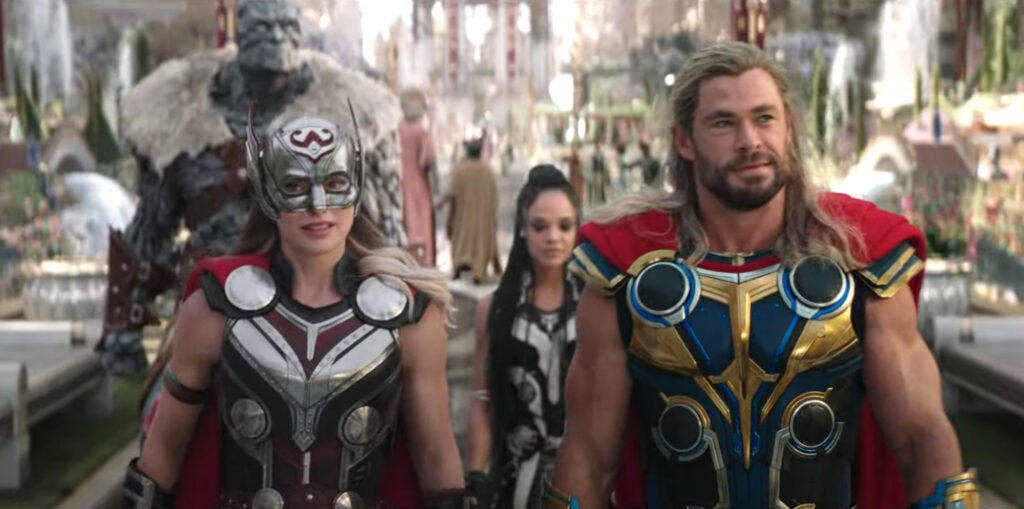
I’ve noticed that people have been pounding their fists in the internet sand demanding for the magical ‘batsh#t crazy’ (as Chris Hemsworth called it) now mythical 4 hour cut of the film that was originally edited together.
I am happy to say that Taika has finally responded to these people demanding the “Taika Cut,” telling them what I’ve been telling everyone for the past two decades, which is that directors cuts are always terrible and that the theater cut is the best cut of the film.
Which begs the question: Is this cut actually good?
A quick plot recap first. This God named Gorr, played by Christian Bale, is hunting down a bunch of Gods because they’re responsible for killing his daughter. And Thor is next.
So Gorr heads to a place called New Asgaard, which, if I’m to understand this right, is a tiny theme park on earth that simulates where Thor is originally from? I think. Anyway, Gorr kidnaps all the children who are there that day and takes them to his planet.
Thor, then, teams up with Valkyrie, rock-monster Korg, and Jane, his old girlfriend, who now happens to be Thor, because she was dying of cancer and read somewhere that the Thor hammer makes you super-healthy or something. So she goes to New Asgaard to get the hammer and, in doing so, becomes Thor and cures her cancer.
Now when Captain America was able to pick up the Thor hammer, he didn’t automatically become Thor so… I’m not sure what’s going on there. But the point is, Jane, aka Thor, joins Thor, Valkyrie, and Korg on their journey to rescue the children.
On the way there, they try to recruit Zeus, since, you know, Gorr’s going to be coming after him next. But that fails miserably. Which means they’re going to have to go it alone. I’ll leave it up to you to guess whether they succeed or not.
I know that in this love it or thunder it era, you’re not allowed to have nuanced feelings about films. But I don’t know how you discuss Thor: Love and Thunder without having a nuanced take. Because there are some really bad things in this movie. But there’s also really good stuff too! So it’s hard to lay it over the “terrible” barrel and give it a spanking. It hasn’t misbehaved enough to do so.
Let’s start with the really good, which is Christian Bale. I feel bad for Bale because this may be the best acting job he’s ever done. I mean that. And it’s going to be lost in a mid-tier Marvel movie. The opening scene where he loses his daughter is heartbreaking. The following scene where he kills a God is mesmerizing. And any scene he was in after that was captivating.
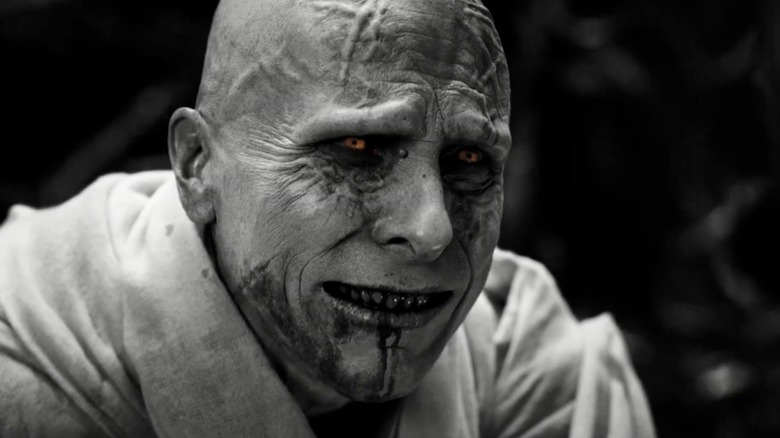
However, Christian Bale is in a completely different movie from everybody else, starting with Thor. Thor is in Dumb and Dumber. That’s really what I would compare this to. It’s Marvel’s version of Dumb and Dumber. Except instead of Jim Carrey and Jeff Daniels, we get Chris Hemsworth and Natalie Portman.
What’s so baffling about Natalie Portman is how bad she is in this movie. But what’s even more baffling is that any of us thought that wouldn’t be the case. Portman had zero chemistry with Hemsowrth in the FIRST two Thor movies. Did we all think that Taika had some magical dust he would be able to sprinkle over them that would change that?
You can’t change bad chemistry.
And it’s weird how Portman’s delivery of this fast-and-free go-with-the-flow character comes off so forced. This is how she came into the industry, playing a can’t-shut-up 13 year old temptress who belts out non-stop dialogue like air (Beautiful Girls). Why does she seem so uncomfortable doing it here? She basically destroys any scene she’s in.
As for Thor, I guess they’ve gone full comedy with him. There are no more attempts to even pretend this character should be taken seriously. He’s cracking jokes no matter how close to death he gets. And it undercuts any tension that desperately tries to help this movie work. I felt higher stakes in The Hangover than I did Thor: Love and Thunder.
For example, Takia made this bizarre decision to give Thor a hologram video call ability whereby he could pop into the captured kids’ cage whenever he wanted and crack a bunch of jokes so they stayed calm. And Im thinking, “Do they realize how much suspense and fear and tension this choice destroys?” By showing us a visual of him and the kids hanging out, making jokes, you are showing us that the protagonist has succeeded a full hour before he’s succeed. It’s like you don’t want us to worry even a little bit.
I’m not going to lie. That threw me.
As a screenwriter, one of your mandatory jobs — especially in big budget Marvel movies — is to build as much doubt as possible into your story. The goal must seem impossible. When you do this correctly, we are desperate to keep watching because we have no idea how our characters are going to succeed. We watch to see them figure it out against all odds.
So I don’t know why you would deliberately eliminate all doubt. I suppose I understand that Thor is a full-on comedy at this point. But like I said, I had more doubt that Stu, Allen, and Phil, would find Doug than I did Thor would save these kids.
If you look back at Indiana Jones – the first one – Indiana Jones cracked jokes. It’s part of what made that character so charming. But he didn’t do it EVERY SINGLE LINE. He did it every few scenes or so. That way, when he *did* do it, it had impact.
If we know a joke is coming out of a character’s mouth every single time they speak, you lose that impact that a good joke has. Which means that, now, the jokes have to be EXTRA GOOD to land, because they’re competing against hundreds of other jokes. And that was another problem with this movie. The jokes just weren’t landing.
I will give it to Taika, though. He took big swings. He did so with a major character having cancer. He had a magical mystery tour bus that flew on rainbows and was driven by giant screaming goats. One of his characters was a rock man who lost his entire body and his face was taped to the back of another character. He’d do weird things like crash his characters into a 1960s model of a planet, breaking the filmmaking 4th wall.
It was as if he said, “Every time we come to a fork in the road, we are always going to pick weird.” I love that attitude. It’s better than the other route, for sure.
The most important question to come out of all of this, of course, is “Has Taika lost his magic touch?” Since I’m resting the future of Star Wars on his shoulders, that answer matters to me. I was terrified, after hearing some bad reviews of Love and Thunder, that the Taika train had been relegated to the maintenance track. But I think I understand what happened here. He made Ragnanok. And Ragnarok was perfect. But he didn’t want to repeat that. He had to have a challenge to stay interested in the franchise. So he said, “I’m going to push things further than I’ve ever pushed them before and treat it as a giant experiment.” And that’s why I feel safe with Taika and Star Wars. I think this was an experiment for Taika and he had a blast.
I didn’t have a blast with him. But I left the theater entertained.
[ ] What the hell did I just watch?
[ ] wasn’t for me
[x] worth the price of admission
[ ] impressive
[ ] genius
What I learned: There was a clever use of exposition here. Taika and Robinson had Korg tell a story to children about where Thor was in his life to deal with a lot of information that the audience needed to know (you can hear an abbreviated version of this in the Thor trailer). This is way better than trying to force expositional dialogue into a casual conversation. But what I really liked about this choice was that they used it to set up another important expositional chunk of information. When Jane shows up into the movie, we immediately go back to Korg now telling the story of Jane. When I say they used the first story to set up the second, what I mean is, this Jane exposition story scene doesn’t work if we didn’t have the first one with Thor. The audience would’ve been confused. So I thought that was really clever that they got a 2 for 1 there. The other day I was talking about how you can tell a writer’s improving by how invisible his exposition is getting. And this is a good example of that.
